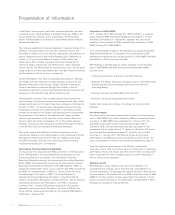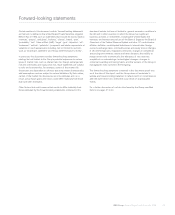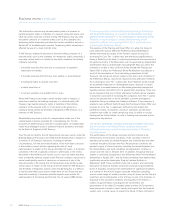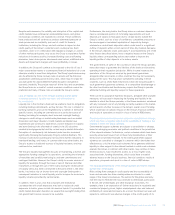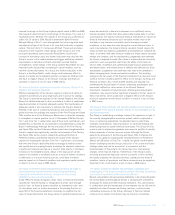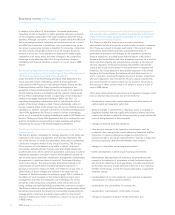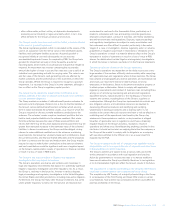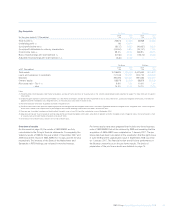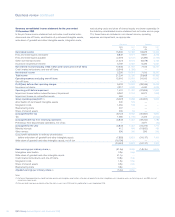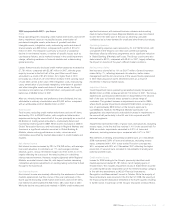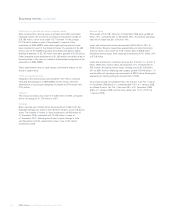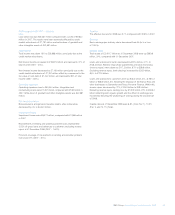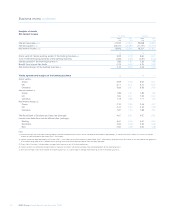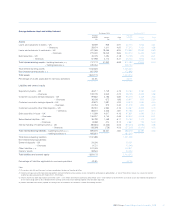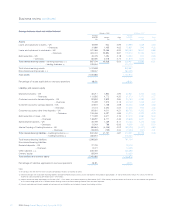RBS 2008 Annual Report Download - page 34
Download and view the complete annual report
Please find page 34 of the 2008 RBS annual report below. You can navigate through the pages in the report by either clicking on the pages listed below, or by using the keyword search tool below to find specific information within the annual report.
33RBS Group Annual Report and Accounts 2008
•other unfavourable political, military or diplomatic developments
producing social instability or legal uncertainty which, in turn, may
affect demand for the Group’s products and services.
The Group’s results have been and could be further adversely affected
in the event of goodwill impairment.
The Group capitalises goodwill, which is calculated as the excess of the
cost of an acquisition over the net fair value of the identifiable assets,
liabilities and contingent liabilities acquired. Acquired goodwill is
recognised initially at cost and subsequently at cost less any
accumulated impairment losses. As required by IFRS, the Group tests
goodwill for impairment annually or more frequently, at external
reporting dates, when events or circumstances indicate that it might be
impaired. An impairment test involves comparing the recoverable
amount (the higher of value in use and fair value less cost to sell) of an
individual cash generating unit with its carrying value. The value in use
and fair value of the Group’s cash generating units are affected by
market conditions and the performance of the economies in which the
Group operates. Where the Group is required to recognise a goodwill
impairment, it is recorded in the Group’s income statement, although it
has no effect on the Group’s regulatory capital position.
The Group may be required to make further contributions to its
pension schemes if the value of pension fund assets is not sufficient
to cover potential obligations.
The Group maintains a number of defined benefit pension schemes for
past and current employees. Pensions risk is the risk that the liabilities of
the Group’s various defined benefit pension schemes which are long
term in nature will exceed the schemes’ assets, as a result of which the
Group is required or chooses to make additional contributions to the
schemes. The schemes’ assets comprise investment portfolios that are
held to meet projected liabilities to the scheme members. Risk arises
from the schemes because the value of these asset portfolios and
returns from them may be less than expected and because there may be
greater than expected increases in the estimated value of the schemes’
liabilities. In these circumstances, the Group could be obliged, or may
choose, to make additional contributions to the schemes, and during
recent periods, the Group has voluntarily made such contributions. Given
the current economic and financial market difficulties and the prospects
for them to continue over the near and medium term, the Group may be
required or elect to make further contributions to the pension schemes
and such contributions could be significant and have a negative impact
on the Group’s capital position results of operations or financial condition
or result in a loss of value in RBS shares.
The Group is and may be subject to litigation and regulatory
investigations that may impact its business.
The Group’s operations are diverse and complex and it operates in
legal and regulatory environments that expose it to potentially significant
litigation, regulatory investigation and other regulatory risk. As a result,
the Group is, and may in the future be, involved in various disputes,
legal proceedings and regulatory investigations in the United Kingdom,
the United States and other jurisdictions, including class-action litigation.
Furthermore, the Group, like many other financial institutions, has come
under greater regulatory scrutiny over the last year and expects that
environment to continue for the foreseeable future, particularly as it
relates to compliance with new and existing corporate governance,
employee compensation, conduct of business, anti-money laundering
and anti-terrorism laws and regulations. Disputes, legal proceedings
and regulatory investigations are subject to many uncertainties, and
their outcomes are often difficult to predict, particularly in the earlier
stages of a case or investigation. Adverse regulatory action or adverse
judgements in litigation could result in restrictions or limitations on the
Group’s operations or result in a material adverse effect on the Group’s
reputation or results of operations or result in a loss of value in RBS
shares. For details about certain litigation and regulatory investigations
in which the Group is involved, see Note 32 on the financial statements.
Operational risks are inherent in the Group’s operations.
The Group’s operations are dependent on the ability to process a very
large number of transactions efficiently and accurately while complying
with applicable laws and regulations where it does business. The Group
has complex and geographically diverse operations and operational risk
and losses can result from internal or external fraud, errors by
employees or third-parties, failure to document transactions properly or
to obtain proper authorisation, failure to comply with applicable
regulatory requirements and conduct of business rules (including those
arising out of anti-money laundering and anti-terrorism legislation),
equipment failures, natural disasters or the inadequacy or failure of
systems and controls, including those of the Group’s suppliers or
counterparties. Although the Group has implemented risk controls and
loss mitigation actions, and substantial resources are devoted to
developing efficient procedures and identifying and rectifying
weaknesses in existing procedures and to training staff, it is not
possible to be certain that such actions have been or will be effective in
controlling each of the operational risks faced by the Group. Any
weakness in these systems or controls, or any breaches or alleged
breaches of applicable laws or regulations could have a materially
negative impact on the Group’s business, reputation, results of
operations and share price. Notwithstanding anything contained in this
risk factor, it should not be taken as implying that either the company or
the Group will be unable to comply with its obligations as a company
with securities admitted to the Official List or as a supervised firm
regulated by the FSA.
The Group is exposed to the risk of changes in tax legislation and its
interpretation and to increases in the rate of corporate and other taxes
in the jurisdictions in which it operates.
The Group’s activities are subject to tax at various rates around the
world computed in accordance with local legislation and practice.
Action by governments to increase tax rates or to impose additional
taxes would reduce the Group’s profitability. Revisions to tax legislation
or to its interpretation might also affect the Group’s results in the future.
The acquisition of a majority shareholding in the Group by HM Treasury
could lead to certain adverse tax consequences for the Group.
The acquisition by HM Treasury of a majority shareholding in the Group
in consequence of the First Placing and Open Offer could, in certain
circumstances, have adverse tax consequences which could affect the
post-tax profitability of the Group.



